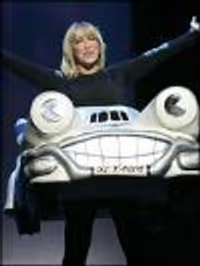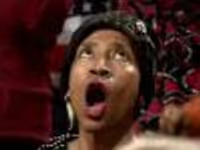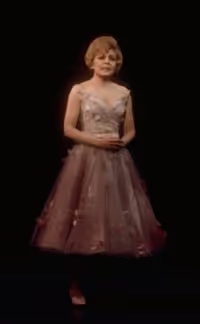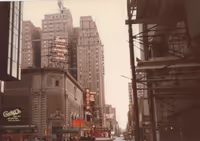STRAIGHT WHITE MEN Previews
walnutoraroach
Swing Joined: 6/30/18
#25STRAIGHT WHITE MEN Previews
Posted: 6/30/18 at 10:42pm
I was there tonight (yes, I just joined BWW; no, I’m not in any way connected to the production). I found Straight White Men engaging and fairly moving, though uneven. The pre-show and first five minutes are wickedly subversive, but the play then settles into a gentle exploration of a family that feels pointed only in its lack of subversion. Framed as it as a play about straight white men (the set is literally a picture frame engraved with those three words), Young Jean Lee’s work nevertheless treats its characters as a quartet of complex, nuanced, thoughtful people and not as stereotypes or figures of satire. This family does have its share of problems (handled tenderly and sometimes heartbreakingly), but what most distinguishes this father and trio of sons is that they are all motivated exclusively by love for one another. Cast is pretty terrific and have great rapport, even with Stephen Payne, very good, stepping in for Denis Arndt. Armie Hammer is delightful, especially in his playfights with Josh Charles as his older brother, and Ty Defoe is sweetly tortured as the emotional enigma at the heart of the clan. Some of Lee’s dialogue and jokes feels familiar, but I never lost interest and the characters feel specific enough to withstand the occasional cliche. (Kate Bornstein and Ty Defoe are awesome, if maybe underused, although I won’t give away their roles.) Anna D. Shapiro’s staging is sharp. There were a few moments that seemed a little less crisp than the rest of the play - definitely a handful of lines across the board. that aren’t landing yet. I’m still not entirely sure how the setup broadly affects audiences’ experiences of the play. The discussions of race and privilege that the characters have themselves are substantial and usually provocative but don’t feel particularly central. I suppose I was most struck by Lee’s aggressive compassion — early on in the play, Bornstein’s character tells the audience that being kind to people you have reasons not to love can be really difficult - and maybe that is the intended takeaway. I wanted to get it but left unsure how much there was for me to get. Interested to see how this fares — a trickily subtle play for Broadway crowds, maybe, but wonderful to have an Asian- American female playwright, female director, and some non-binary performances as the season launches!
#26STRAIGHT WHITE MEN Previews
Posted: 6/30/18 at 11:04pm
I’m seeing this tomorrow afternoon...thanks for your thoughts, but why did Arndt not go on? I assumed, obviously falsely, that the reason they pushed back the first preview was to give Arndt more time with the script. Is Payne Arndt’s understudy? Was he off book?
walnutoraroach
Swing Joined: 6/30/18
#27STRAIGHT WHITE MEN Previews
Posted: 6/30/18 at 11:29pmYup, Payne’s his understudy. He was off-book — seemed quite comfortable.
Solipsist234
Featured Actor Joined: 5/25/18
#28STRAIGHT WHITE MEN Previews
Posted: 6/30/18 at 11:39pmSooooo what exactly was the point in canceling the first couple of previews if the understudy was able to go on? Was he the one that wasn't ready? So many questions!
LightsOut90
Broadway Legend Joined: 5/2/14
#29STRAIGHT WHITE MEN Previews
Posted: 6/30/18 at 11:51pm
would lov e to know why they didn't just bring Austin Pendleton in from the off-broadway run
#30STRAIGHT WHITE MEN Previews
Posted: 7/1/18 at 12:57am
So much to say about this one and so many questions. This is going to sound negative, but I actually enjoyed the show. Here we go (SPOILERS AHEAD):
1) After watching an hour and forty minutes, I have no idea what I was supposed to take away from the experience. It's marketing itself as a subversive look at straight white men and identity, but it's not that. There are a few moments when the guys seem like frat boys, but overall, they are well-meaning and fun. So am I supposed to dislike them because they're privileged white boys? Am I supposed to think their relics of a species that's fallen by the wayside (the play is framed in a literal frame, like we're observing them in a zoo-like setting)? Or am I supposed to enjoy the experience of hanging with this family for a bit and not even think about privilege (if that's the case, why the title)?
2) The older people around me hated the music at the beginning. I hated the lyrics, but thought they were being used to challenge "acceptable" norms, so it didn't bother me.
3) Also unsure of the purpose of the two gender-binary characters. They started in the audience before the play, but there wasn't much interaction that they had with the audience. They just seemed to walk around. They also ended the play, but again, WHY???
4) There were so many moments that seemed like they'd pay off in the end, but they never did: the father carefully placing items in the boys' Christmas stockings, the father dropping a bowl of potato chips, the brother methodically cleaning up the chips and the beer bottles, the brother CRYING, multiple mentions of their neighbor, etc. If you're just giving a glimpse into their lives, fine, but shouldn't something actually happen in this play? What is the purpose of all of this???
5) The performances were the best part of the whole thing. All three brothers were excellent. They already seem to have an ease with each other, and I was so impressed with Armie Hammer. He typically seems wooden (in my opinion), but I found him lovable, funny, and totally game. There were moments of singing, dancing, and wickedness between the family that was delightful.
6) If the play was called "Hanging With Three Brothers" I wouldn't have a problem with how it's all being marketed. It seems to want us to question roles and status quo, but the only thing I left questioning was the point of it all. There is SO much potential here, but they need to figure out what they want to say with the piece and then actually say it.
walnutoraroach
Swing Joined: 6/30/18
#31STRAIGHT WHITE MEN Previews
Posted: 7/1/18 at 8:10am
DramaTeach said: "
1) After watching an hour and forty minutes, I have no idea what I was supposed to take away from the experience. It's marketing itself as a subversive look at straight white men and identity, but it's not that. There are a few moments when the guys seem like frat boys, but overall, they are well-meaning and fun. So am I supposed to dislike them because they're privileged white boys? Am I supposed to think their relics of a species that's fallen by the wayside (the play is framed in a literal frame, like we're observing them in a zoo-like setting)? Or am I supposed to enjoy the experience of hanging with this family for a bit and not even think about privilege (if that's the case, why the title)?
6) If the play was called "Hanging With Three Brothers" I wouldn't have a problem with how it's all being marketed. It seems to want us to question roles and status quo, but the only thing I left questioning was the point of it all. There is SO much potential here, but they need to figure out what they want to say with the piece and then actually say it."
I could be wrong -- I spent a lot of the time watching the play just trying to answer these questions for myself -- but my understanding was that the point of the play is that, with the pre-show music, the non-binary "People in Charge," the picture frame, the title, etc., we're expecting something satirical, pointed, and critical of straight white men that generalizes and mocks them. Instead, we get a play filled with characters we root for and like. I kept trying to figure out if there was something else -- are we in some futuristic dystopia/utopia? are they going to turn out to be awful? will there be some big revelation about their identities? -- but seeing the play as an act of subversive empathy was the clearest reading I could come up with. I don't know if it's particularly powerful to see an act of empathy towards straight white men on Broadway when there have been relatively few empathetic depictions of people who are not straight or white produced on Broadway, but it makes sense in the broader constellation of 2010s theatre that has been astutely critical of various modes of privilege and whiteness. I think there must be some element of wanting the audience to try to make sense of it, but I'm not sure if it's entirely clear, even if my interpretation is correct (and it works for me, at least) what sort of engagement Lee wants her audiences to have with the play or its frame. (And I'd respectfully disagree that things happen for no reason -- amongst the myriad living room dramas, I found it particularly lucid and most of the moments you describe I thought were useful in understanding character.)
#32STRAIGHT WHITE MEN Previews
Posted: 7/1/18 at 8:34am
I’m fine with it being about empathy for ALL, including straight white men, but I don’t think that was clear enough that that was the intention of the piece. How am I supposed to feel about the brother who cries but doesn’t ever explain what’s bothering him and has absolutely no drive? If he never explains why he’s upset, how do I have empathy? Am I supposed to be fine with people having no desire to make more of themselves (Armie’s character mentions his brother’s lack of confidence and purpose, but they go no deeper in discovering the why).
I suppose you’re right, that the point is just that we should accept people at face value, but that’s frustrating because in real life, I want to know what makes people they way they are, so I can have a better understanding of them. Since I did enjoy the play, I hope they decide to either delve deeper into the characters or make the message of acceptance of a person’s surface clearer.
Impossible2
Broadway Legend Joined: 3/31/18
#33STRAIGHT WHITE MEN Previews
Posted: 7/1/18 at 8:47am
DramaTeach said: "I’m fine with it being about empathy for ALL, including straight white men, but I don’t think that was clear enough that that was the intention of the piece. How am I supposed to feel about the brother who cries but doesn’t ever explain what’s bothering him and has absolutely no drive? If he never explains why he’s upset, how do I have empathy? Am I supposed to be fine with people having no desire to make more of themselves (Armie’s character mentions his brother’s lack of confidence and purpose, but they go no deeper in discovering the why).
I suppose you’re right, that the point is just that we should accept people at face value, but that’s frustrating because in real life, I want to know what makes people they way they are, so I can have a better understanding of them. Since I did enjoy the play, I hope they decide to either delve deeper into the characters or make the message of acceptance of a person’s surface clearer."
It's none of your business why people are the way they are perhaps?
kevinr
Featured Actor Joined: 2/21/05
#34STRAIGHT WHITE MEN Previews
Posted: 7/1/18 at 8:52am
I am seeing this next week and hoping to meet Armie Hammer & Josh Charles at the Stage Door afterwards. Any info about the stage door would be appreciated.
#35STRAIGHT WHITE MEN Previews
Posted: 7/1/18 at 8:55am^ So Armie’s character shouldn’t try to better understand his brother? We should all just be concerned with ourselves? Isn’t that part of the problem in the world - that people can’t see others’ point of view or insight?
#36STRAIGHT WHITE MEN Previews
Posted: 7/1/18 at 9:23am
kevinr said: "I am seeing this next week and hoping to meet Armie Hammer & Josh Charles at the Stage Door afterwards. Any info about the stage door would be appreciated."
The stage door was full of very enthusiastic Armie/Call Me By Your Name fans. My friend wanted to wait, so we hung out. It took 30-40 minutes for Armie and Paul Schneider to come out. They signed quickly (Armie signed a peach and a copy of Andre Aciman’s book amongst other things). No pictures, so people took them of him as he signed. People were also going up to his wife who got out of her car to talk and hug people. Fascinating. After waiting that long, we left and didn’t wait for Josh Charles.
#37STRAIGHT WHITE MEN Previews
Posted: 7/1/18 at 10:11am
For those saying they don't understand the purpose of the Persons in Charge, this author's note from the published script might help elucidate their presence. Potential spoilers for those who haven't seen the show:
"The pre-show music, curtain speech, and transitions are an important part of this play. They should create a sense that this show is under the control of people who are not straight white men. Despite this framing, the play should be performed sincerely and without irony.
Ideally, Person in Charge 1 and Person in Charge 2 should be played by gender nonconforming performers (preferably of color). A good faith effort should be made to find such performers, but I am open to variants depending on circumstances. ... In no case should actors be cast to perform identities other than their own.
The performers playing Person in Charge 1 and Person in Charge 2 should be empowered to say whatever they want to audience members when they're in the house before the show begins, and should feel free to ad-lib responses as necessary to the audience during the curtain speech. They should be given a voice in and veto power over all aspects of their roles, including costumes and performance style. It is essential that the performers should be fully on board with their roles."
#38STRAIGHT WHITE MEN Previews
Posted: 7/1/18 at 2:09pm
^ ^ AC126748, thanks for posting this. I'm seeing the show Tuesday and I'm actually glad I saw that note first.
"Hey little girls, look at all the men in shiny shirts and no wives!" - Jackie Hoffman, Xanadu, 19 Feb 2008
#39STRAIGHT WHITE MEN Previews
Posted: 7/1/18 at 6:23pm
I’m back from the matinee and agree with others about have mixed feelings about the content, although I did enjoy the acting and it was never a slog to sit through, which can so often be the case with a Clybourne Park-type screed, as After Eight would say.
Straight White Men isn’t a screed though. It’s more like screed-lite. I was digging the pre-show and liked the intro by the non-binary actors (even if it was a little on the nose), but then once the play proper begins I don’t think it had so much to say. The acting was good, especially from Armie and Josh Charles. Payne fit right in as the patriarch of the family.
Having been raised in the Midwest, I 100% know families like this and think the dialogue was realistic, etc. Given the pre-show and framing device, I was expecting something far more biting and stylized. I would have rather had an August: Osage County with some “Eat the fish, Bitch” and “I’m running things now,” type lines and then a backdrop of white privilege satire. Instead, it had the bite of an episode of The Wonder Years.
Considering this play was written by a non-white woman and directed by a woman, I was hoping for a less straight-forward take on straight white (American) men. Neugebauer does keep the action moving and wrings plenty of humor out of the situations that could have induced cringe, but it doesn’t rival the performances she got out of actors in Albee’s at Home at the Zoo early in the year.
Like DramaTeach, all this makes me sound like I hated it, which isn’t true. I liked it, but felt it could have been so much more. Although, maybe that is just me wanting it be something it never intended to be as well!
#40STRAIGHT WHITE MEN Previews
Posted: 7/1/18 at 6:35pm
I haven’t read seen the play, but hearing the feedback and reading the author’s note that was posted (thanks!) I have to say it sounds like a concept in search of a play. If you’re going to frame a traditional kitchen-sink play focusing on Straight White Men, the play itself has to be incredible. I would rather get the intriguing framing device with a production of Death of a Salesmen or All My Sons (this concept screams Miller to me). Then, you would get a brilliant play along with what sounds like the most interesting (and biting) part of this production.
The playwright’s Song of the Dragon Flying to Heaven is a very interesting (if slight) piece that is heavily stylized, so I was hoping this would more in that vein.
Whizzer - is the framed play Nelson-style realistic in terms of dialogue? Does the concept feel like it pays off, or is it more like “I get what you’re saying, but so what?”
#41STRAIGHT WHITE MEN Previews
Posted: 7/1/18 at 6:35pm
I haven’t read seen the play, but hearing the feedback and reading the author’s note that was posted (thanks!) I have to say it sounds like a concept in search of a play. If you’re going to frame a traditional kitchen-sink play focusing on Straight White Men, the play itself has to be incredible. I would rather get the intriguing framing device with a production of Death of a Salesmen or All My Sons (this concept screams Miller to me). Then, you would get a brilliant play along with what sounds like the most interesting (and biting) part of this production.
The playwright’s Song of the Dragon Flying to Heaven is a very interesting (if slight) piece that is heavily stylized, so I was hoping this would more in that vein.
Whizzer - is the framed play Nelson-style realistic in terms of dialogue? Does the concept feel like it pays off, or is it more like “I get what you’re saying, but so what?”
#42STRAIGHT WHITE MEN Previews
Posted: 7/1/18 at 6:57pm
It’s not quite as hype-realistic as The Apple Family plays, but the dialogue is truthful and (mostly) not forced. I assume Young Jean Lee grew up around this milieu because she really nails it. I’m shocked in a way that this wasn’t some autobiographical play by a straight, white Midwestern guy. Nelson’s works at The Public of late have been some of my absolute favorite plays of the past decade, so it’s an unfair comparison.
And it’s not like Young Jean Lee has to write about Asian-American issues, but given how few plays we see each year (if any!) that deal with the Asian-American experience, it’s shame that we didn’t see white privilege through Asian-American eyes. Is there such a thing as Asian-American privilege? How does she feel she ranks on the “privilege scale” in America against whites, blacks, Hispanics, women, gays, etc? I feel like if David Henry Hwang hasn’t written a play, then we won’t see Asians on Broadway in a non-musical.
I realize 2nd Stage was probably trying to be inclusive by programming this, but I think ultimately I didn’t get much out of it and would have much rather explored the lives of the non-binary characters instead.
#43STRAIGHT WHITE MEN Previews
Posted: 7/1/18 at 7:06pm
Whizzer, I would never deign to tell any playwrights what they should or should not write, but I will say that any contemporary play that revolve (primarily) around a straight white family have to be incredibly good for me to think “Yes, this is a play that is worth seeing” or “this is the theatr we should be creating.” The only plays I’ve read that have recently been written that thrill me are Nelson’s play cycles and Jacobs-Jenkins’ brilliant Appropriate. Unfair comparisons, maybe, but I’m pretty tired of these kitchen-sink plays about a bunch of white people.
And as much as I loved The Gabriels, I can’t imagine how much more poignant they would be if they told from the perspective of people of color.
#44STRAIGHT WHITE MEN Previews
Posted: 7/1/18 at 7:11pm
It's a weird play for Broadway for sure. What you have to remember is that when this play was first produced it was done at Young Jean Lee's Theater Company, where Lee herself premiered many extremely experimental plays. The context for this play (including the pre-show) is designed to be viewed by an audience expecting an experimental screed against the white man, so when the play instead is a naturalistic human drama about the difficulty of manhood, it becomes about reversing expectations and challenging empathy from an audience that prefers to distance themselves from the work they're viewing. It makes perfect sense for the play when it pulled the rug out from underneath the audience, but now that it's on Broadway the conceit will get lost for many.
Updated On: 7/1/18 at 07:11 PM#45STRAIGHT WHITE MEN Previews
Posted: 7/1/18 at 7:36pm
>Neugebauer does keep the action moving and wrings plenty of humor out of the situations that could have induced cringe, but it doesn’t rival the performances she got out of actors in Albee’s at Home at the Zoo early in the year. <
Anna D. Shapiro directed Straight White Men, not Lila Neugebauer.
#46STRAIGHT WHITE MEN Previews
Posted: 7/1/18 at 8:26pm
Smaxie, thank you for correcting me. I don’t know why I had mixed Neugebauer and Anna D. Shapiro in my mind. Maybe the silver lining is that there are actually more than two female directors out there for me to confuse?
Synecdoche, that’s an interesting production history, and I can see where that would be so much more effective in another venue. I think not only does this get lost in a Broadway house, but when it’s cast as a star vehicle for Armie Hammer then your audiences are already going to be predisposed to be sympathetic towards him anyway. The row of people in front of me instagramming the curtain and writing things like, “Armie is back there somewhere ??” were definitely ready to love him no matter what.
LightsOut90
Broadway Legend Joined: 5/2/14
#47STRAIGHT WHITE MEN Previews
Posted: 7/2/18 at 1:13am
Synecdoche2 said: "It's a weird play for Broadway for sure. What you have to remember is that when this play was first produced it was done at Young Jean Lee's Theater Company, where Lee herself premiered many extremely experimental plays. The context for this play (including the pre-show) is designed to be viewed by an audience expecting an experimental screed against the white man, so whenthe play instead is a naturalistic human drama about the difficulty of manhood, itbecomes about reversing expectations and challenging empathy from an audience that prefers to distance themselves from the work they're viewing. It makes perfect sense for the play when it pulled the rug out from underneath the audience, but now that it's on Broadway the conceit will get lost for many."
this. this 100%.
#48STRAIGHT WHITE MEN Previews
Posted: 7/2/18 at 1:25am
I applaud 2nd for putting this on Broadway, but I mean, it wasn't even off-Broadway before it became "Broadway." Def. a bold move on their part. I'm excited to see it, and curious.
Danielle49
Broadway Star Joined: 10/28/17
#49STRAIGHT WHITE MEN Previews
Posted: 7/2/18 at 2:18amHaven't seen it, but I plan to. A few months ago, I talked to a playwright who attended a developmental lab for the play. She's also a woman of color, and mentioned that she gave notes to Young Jean Lee. In short, her criticism was that it may be giving more of a voice and platform to straight white men than upholding her own voice as an Asian-American woman, even if it is a criticism. Seeing everyone's responses here only further proves that audiences are in fact interested in stories of diversity and individual experiences - here, the Asian-American experience.
Videos







